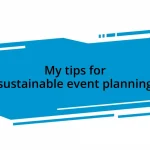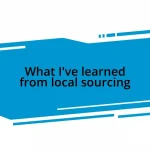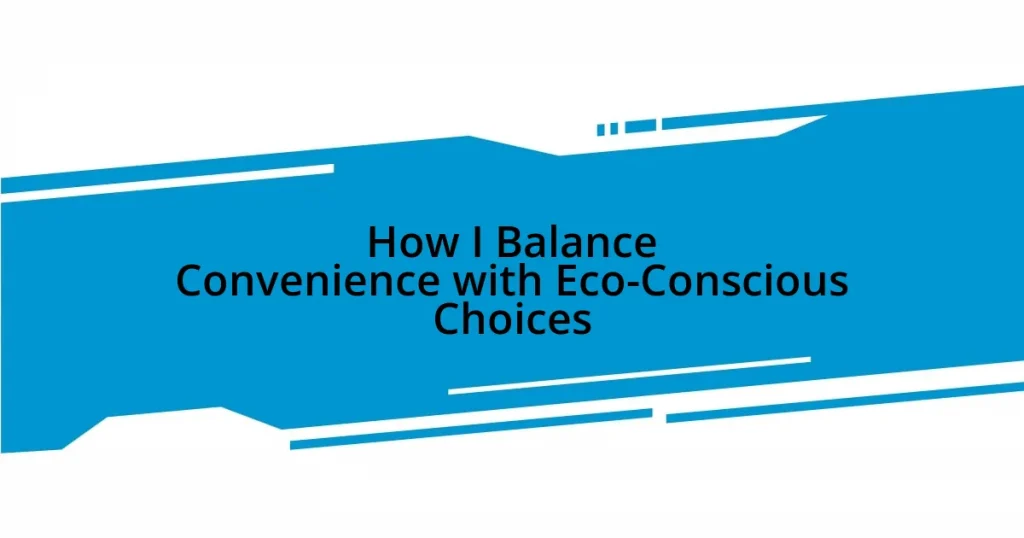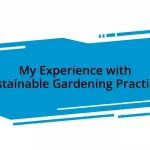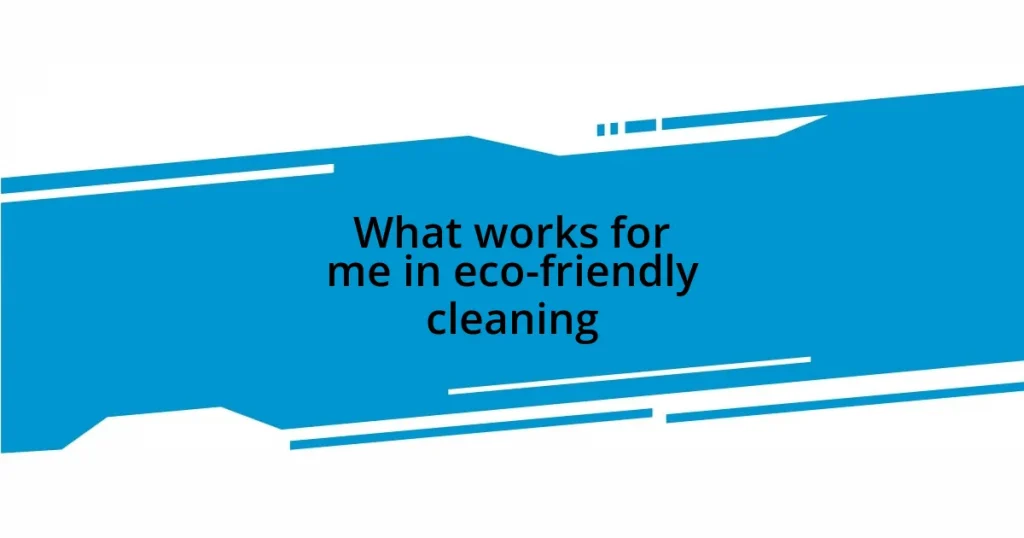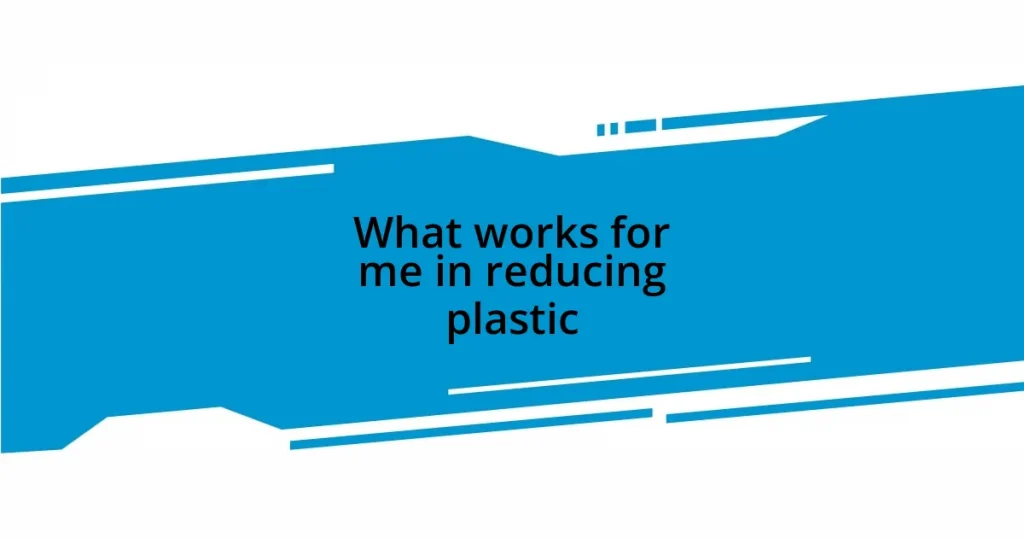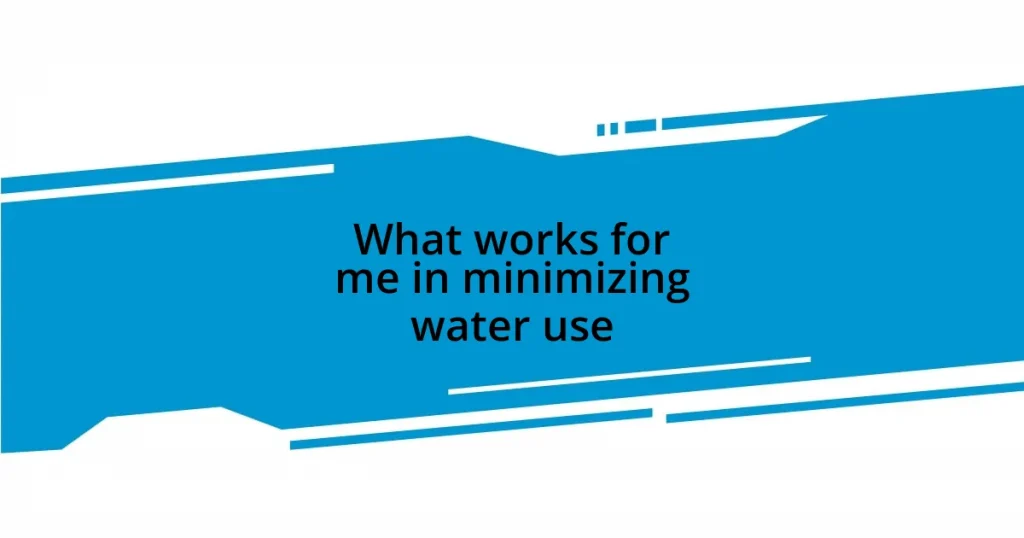Key takeaways:
- Convenience choices often come with hidden costs for both the environment and personal well-being, prompting a need for reflection on values.
- Living eco-consciously involves mindful consumerism, supporting sustainable products, and making informed decisions about purchases.
- Building sustainable habits, like using reusable bags and implementing “meatless Mondays,” fosters intentional environmental impact.
- Measuring the impact of choices, such as tracking plastic use and carbon footprint, enhances awareness and encourages positive lifestyle changes.
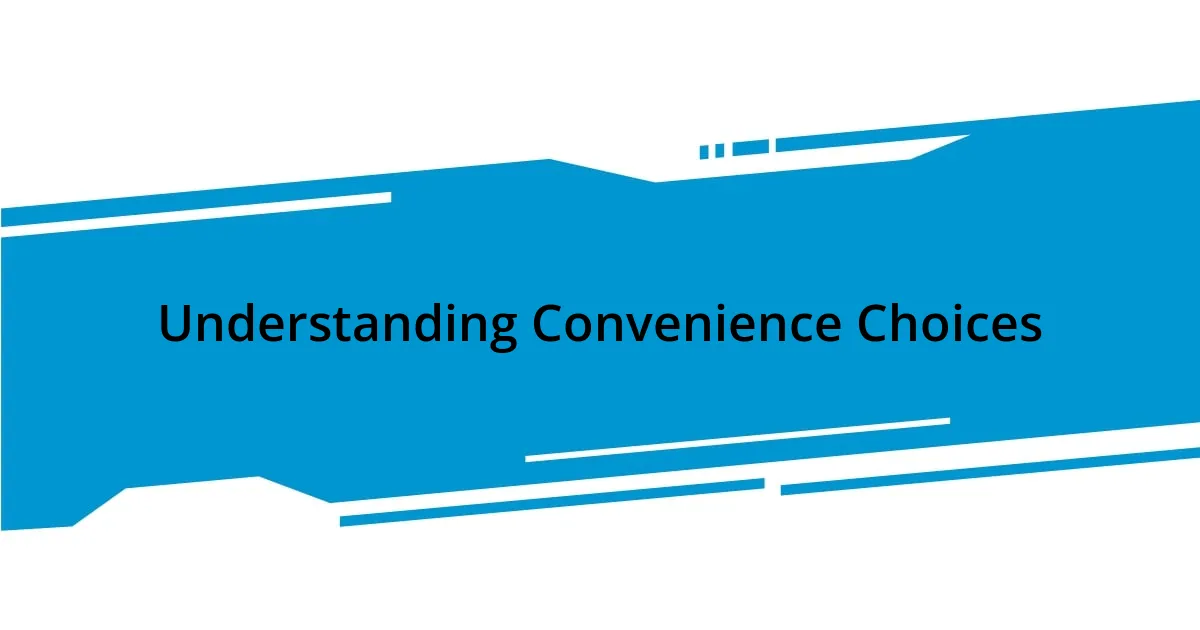
Understanding Convenience Choices
When I think about convenience choices, I often reflect on those hectic mornings when breakfast feels like a race against time. I’ve been there, reaching for a pre-packaged snack instead of making a fresh smoothie. It’s tempting, isn’t it? But I’ve learned that those quick options can sometimes lack the nutrients I need to start my day right.
One aspect that stands out to me is how these choices can create a mental tug-of-war. For instance, when I choose to grab a single-use coffee cup on the go, I can’t help but feel a twinge of guilt. It makes me wonder, what am I willing to sacrifice for just a few extra minutes? Reflecting on these moments has deepened my understanding of what convenience truly means and how it often holds hidden costs—not just in terms of the environment but also for my well-being.
It’s fascinating to see how our lifestyles shape our decisions every day. Every time I stand in front of the grocery aisle, I’m faced with options that promise quick and easy solutions. Yet, as I weigh the pros and cons, I realize that convenience isn’t just about saving time; it’s also about aligning my choices with my values. Have you ever felt that clash between a quick fix and a choice that feels right? I know I have, and it’s in those moments that I gain a clearer perspective on what convenience truly represents in my life.
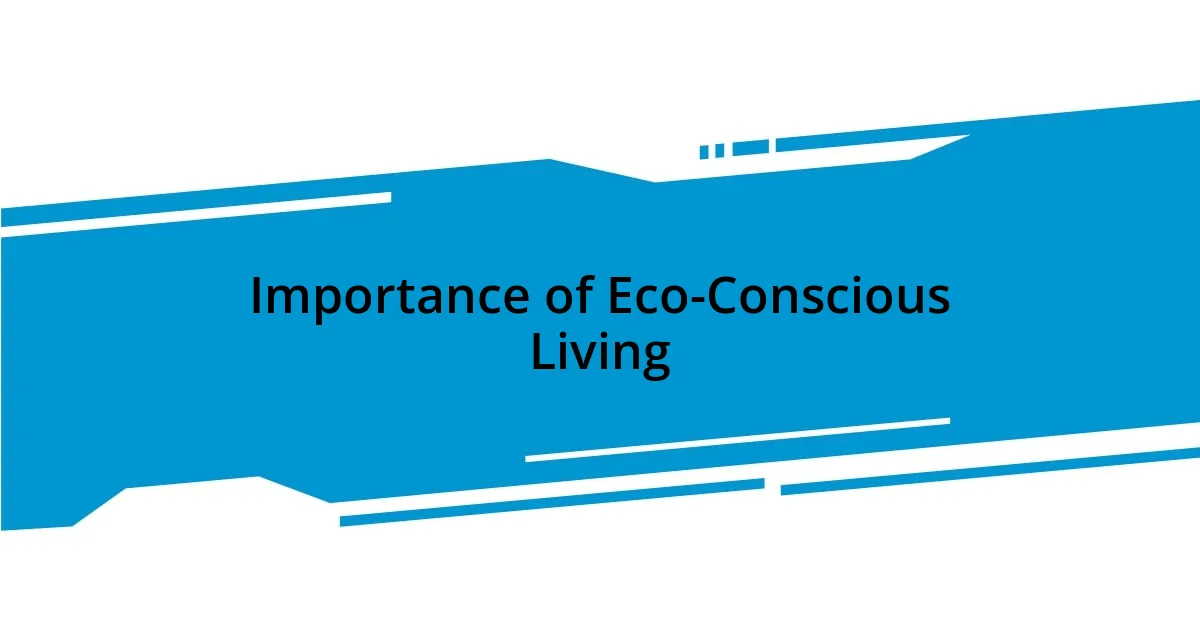
Importance of Eco-Conscious Living
Living eco-consciously is vital because it directly impacts our environment and future generations. I’ve often found myself reflecting on the small choices I make daily. For instance, switching to a reusable water bottle has not only reduced waste but also made me feel like I’m making a tangible difference in combating plastic pollution. Every sip is a reminder that my actions matter.
Moreover, embracing eco-conscious living fosters a deeper connection with nature. Recently, I took a weekend hike, surrounded by vibrant green trees and the sounds of chirping birds. I couldn’t help but think how my small lifestyle changes, like opting for sustainable products, contribute to preserving these beautiful landscapes. Isn’t it fulfilling to think that our choices can help protect the environment we cherish?
Ultimately, eco-conscious living empowers us to become more mindful consumers. I remember the thrill of switching to organic produce, knowing it supports farmers who prioritize sustainable practices. This shift has not only benefitted my health but has also allowed me to support a system that values the planet. Each eco-friendly choice I make reminds me that I’m part of a larger community striving for a healthier planet.
| Aspect | Eco-Conscious Choices |
|---|---|
| Impact on Environment | Reduces waste, conserves resources |
| Personal Responsibility | Encourages mindful consumption |
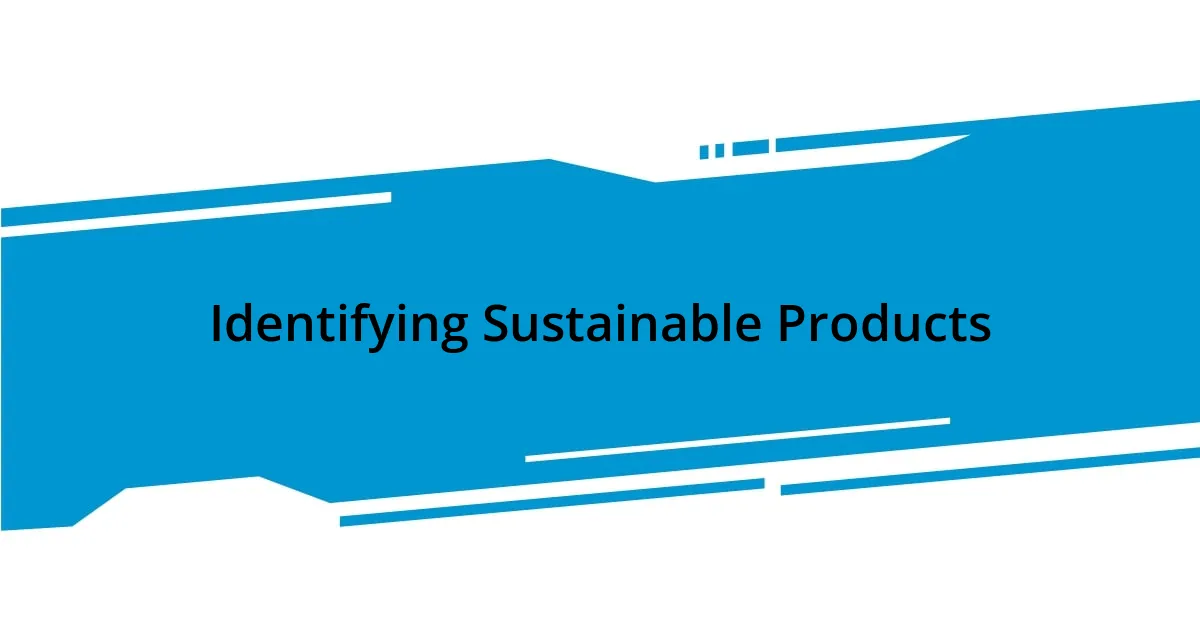
Identifying Sustainable Products
Identifying sustainable products can feel overwhelming at times, but I’ve picked up a few strategies along the way. One that resonates deeply with me is looking beyond the labels on packaging. It’s easy to be swayed by catchy phrases or vibrant colors that promise eco-friendliness, but I’ve learned to dig a little deeper. For example, I always check the ingredients and sourcing methods, prioritizing brands that advocate for transparency.
When I stumbled across a cleaning product that used all-natural ingredients and had a refillable option, it felt like a small victory—every commitment counts! Below are some key factors I consider when identifying sustainable products:
- Materials Used: Are they renewable or recyclable?
- Brand Policies: Does the company have transparent sourcing and manufacturing practices?
- Certifications: Look for eco-labels like USDA Organic or Fair Trade.
- Minimal Packaging: Is the product packaged in a way that reduces waste?
- Longevity: How durable is the product—will it last, or is it disposable?
The more I focus on these elements, the clearer my path becomes in choosing products that align with my values. I aim to support brands that are not just about making a profit but are also committed to bettering the world. It’s an empowering feeling to know that my choices can shape both my lifestyle and the environment.
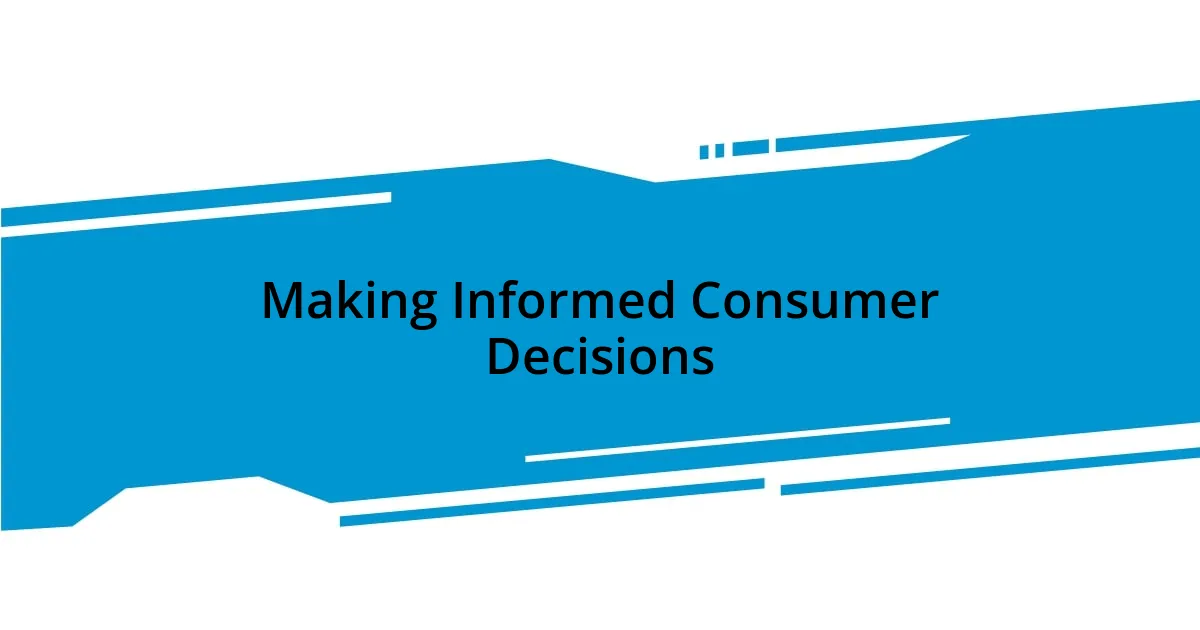
Making Informed Consumer Decisions
Making informed consumer decisions goes beyond just picking products; it’s about understanding the impact of those choices. I vividly recall a time when I was in a grocery store, holding two options for the same item—one conventional, one organic. Just standing there, I felt a surge of responsibility. By choosing organic, I wasn’t just considering my health, but also the broader implications for pesticides affecting our environment and the farmers’ communities. It’s moments like these that truly prompt me to weigh my options carefully.
I’ve also found that educating myself on brands and their practices significantly enhances my decision-making. One afternoon, I took the time to research a clothing brand I admired. I discovered they had a robust commitment to fair labor practices and sustainable materials. Knowing that my money was supporting ethical choices made my next purchase feel right. It reminds me—how much do we really know about the brands we support? It can be challenging, but I believe that investing a bit more time in this could change the impact of our consumer habits dramatically.
Being an eco-conscious consumer is not just about guilt-free shopping; it’s about empowerment. I often engage friends in discussions about their choices, sharing my wins and even missteps, like that time I unknowingly bought a product that claimed to be “eco-friendly” yet was filled with questionable chemicals. It struck me that we all have stories like this, and exchanging them can illuminate the path to better choices together. So, what’s your story? How has your journey shaped the way you purchase?
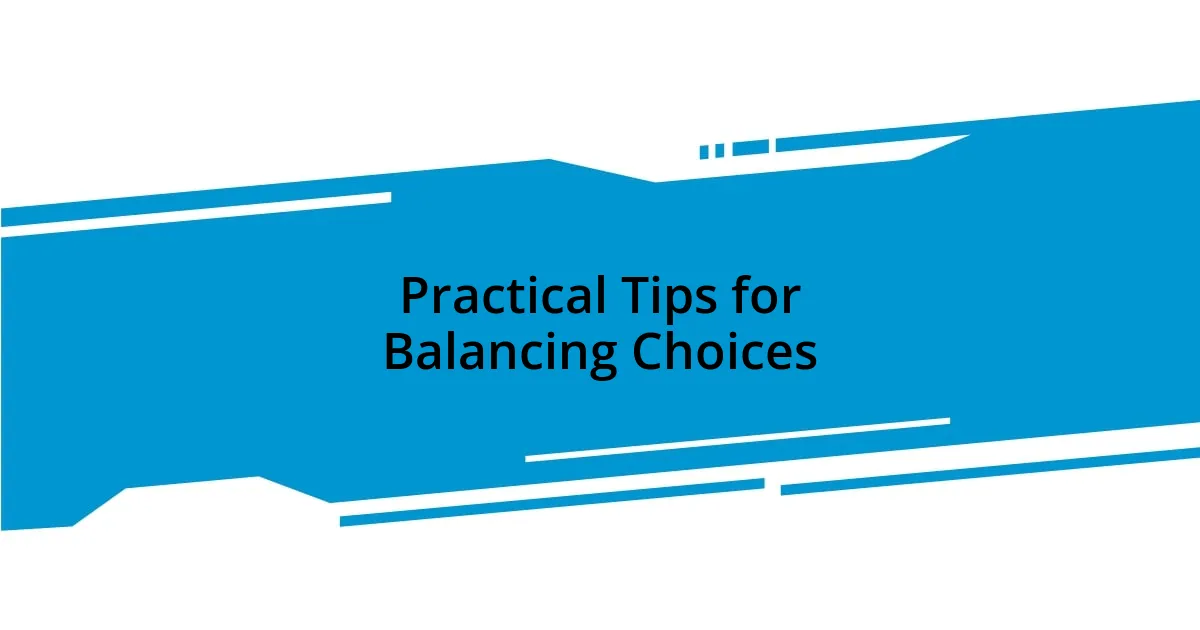
Practical Tips for Balancing Choices
Choosing the right products while staying eco-conscious can be a balancing act, but there are some practical tips that can make this process smoother. One strategy I often employ is creating a grocery list that highlights eco-friendly options. I remember a shopping trip where I had a clear list in hand, steering me away from impulse buys that weren’t sustainable. By sticking to my list, I felt like I was in control, making intentional choices rather than getting swept away by marketing gimmicks that promise shortcuts to convenience.
Another helpful tip is to always consider the lifecycle of the products I use. When I needed to buy a new phone, I opted for a refurbished model instead. Not only did it save money, but it also reduced electronic waste. Thinking about what happens to my purchases when I’m done with them has changed how I view buying decisions altogether. Have you ever considered the journey your products take after you’ve used them?
Finally, I’ve found that engaging with my local community can provide invaluable insights. Joining a local sustainability group has helped me discover brands that prioritize eco-friendly practices. Seeing fellow members share their experiences often inspires me to try new products that I might overlook otherwise. I’ve learned that exchanging knowledge with others can open new doors and transform how we approach purchasing decisions. What have you discovered through your community that shifted your perspective?
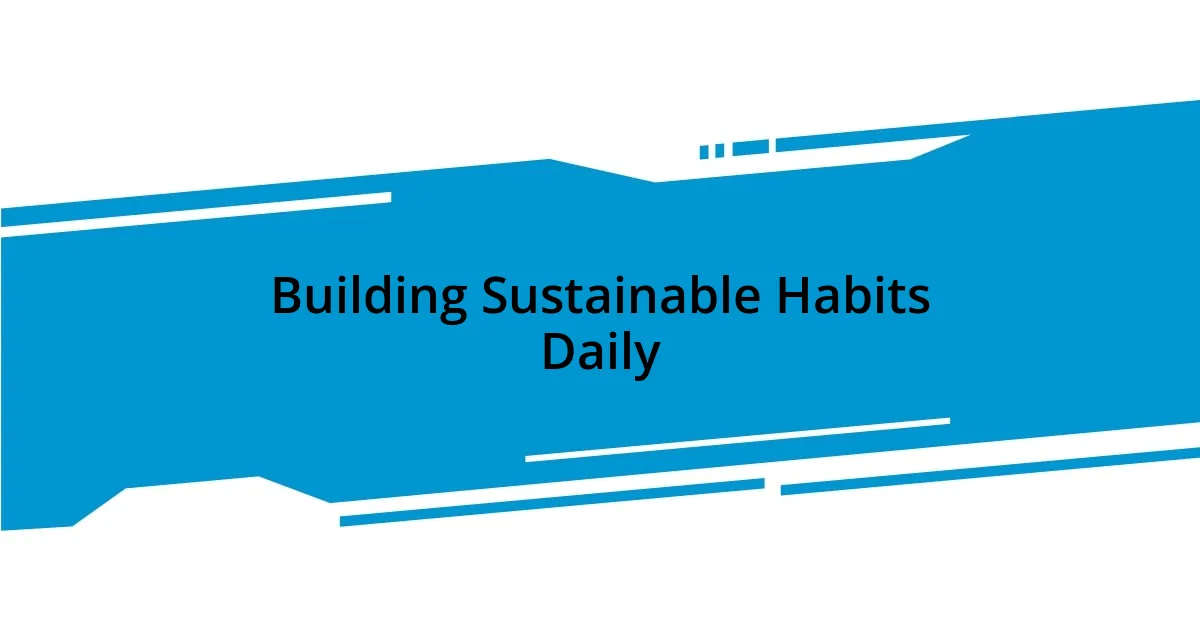
Building Sustainable Habits Daily
I find that building sustainable habits daily is all about creating small, intentional changes that become part of my routine. For instance, I started recycling my waste systematically just by placing visible bins in my kitchen and office. At first, it was a bit of a challenge to remember which bin to use, but over time, it became second nature. It feels rewarding to watch my involvement in recycling grow, doesn’t it?
Moreover, I’ve made it a point to carry reusable bags everywhere I go. I can’t tell you how often I used to forget them and end up with a collection of plastic bags at home. But now, with these reusable bags always in my car or purse, it’s a simple way to reduce my plastic use. This habit not only helps the environment but gives me a sense of pride in making mindful choices. How often do you find yourself reaching for a single-use bag?
Lastly, I’ve incorporated “meatless Mondays” into my meal planning, and honestly, it transformed my relationship with food. Initially, it was a challenge to find recipes that inspired me, but after exploring plant-based options, I found delicious alternatives that I now crave. This weekly habit not only lowers my carbon footprint but has also sparked creativity in the kitchen. What if trying just one meatless meal each week could change your perspective on sustainable eating?
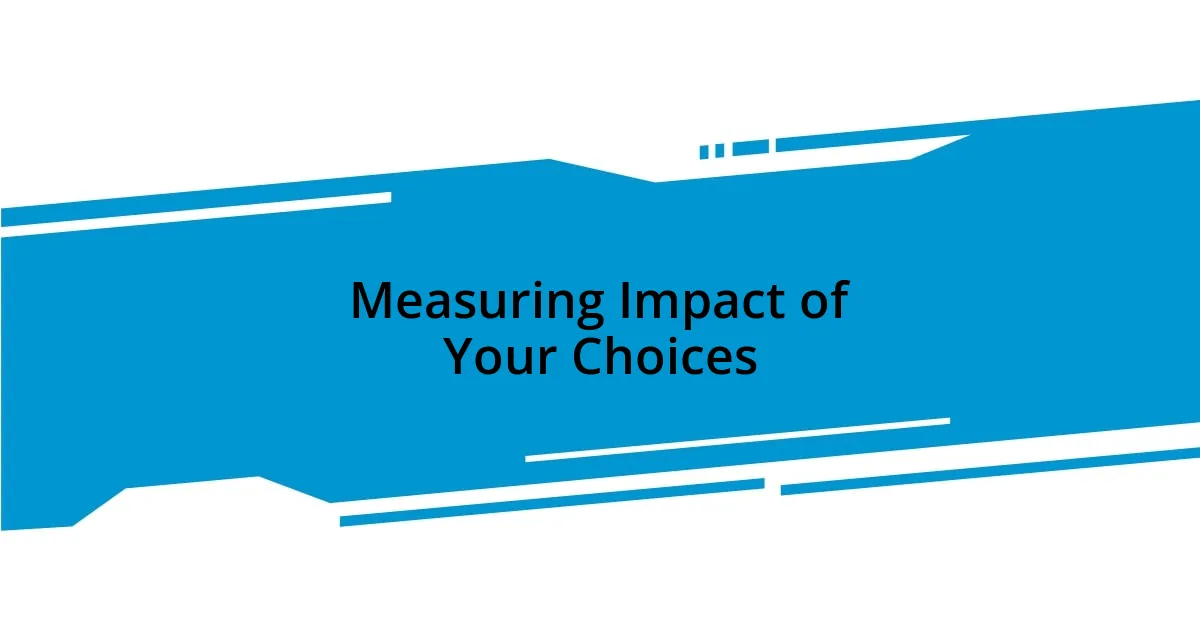
Measuring Impact of Your Choices
It’s vital to evaluate the impact of my choices on the environment. I often reflect on this during my grocery shopping. For example, when I decided to switch to bulk buying, I felt a mix of excitement and apprehension. Initially, the thought of carrying reusable containers felt cumbersome, but once I took that step, it was liberating. It not only cut down on packaging waste, but I gradually realized how much I was saving financially as well. Have you ever calculated the long-term savings of choosing bulk products?
Measuring the impact goes beyond just the immediate benefits; it’s about recognizing the cumulative effect of our habits over time. Recently, I calculated my monthly plastic use and was startled by the figures. It pushed me to take action — like finding alternatives for everyday items. The moment I replaced plastic wrap with beeswax wraps, I felt a sense of progress. And I can’t help but wonder, how many small changes can lead to a substantial reduction in waste?
Finally, I’ve started tracking my carbon footprint through various apps, and it’s been an eye-opening experience. I remember the first time I saw my results; it felt like looking in a mirror and realizing I had some habits that didn’t align with my values. By viewing my choices in a tangible way, I became more aware of their consequences, inspiring me to shift towards more eco-friendly options consistently. How do you keep yourself accountable for your choices?








